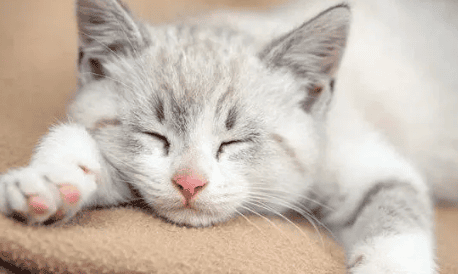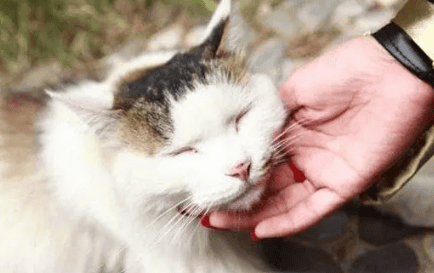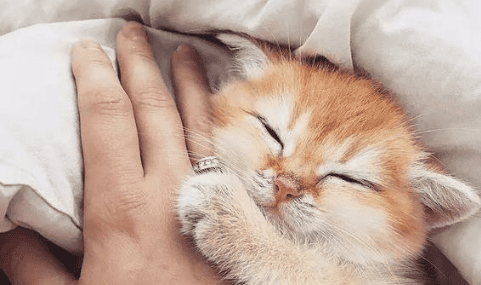One of the most satisfying things in raising a cat is to listen to the cat snoring next to you
And many people will tell you that a cat’s snoring means satisfaction and happiness
< p>But in fact, a cat’s purring does not only mean happinessBut also about how cats purr, why cats purr, or whether purring is intentional or unintentional behavior is poorly understood.

Let’s talk about this today
How do cats purr? The one that purrs?
According to the Journal of Zoology, cats purr through their throat muscles and diaphragm.
When they inhale and exhale, cats activate their laryngeal muscles so that there is a glottal obstruction. When the muscles open again, sound is produced.
The same thing happens to the diaphragm when the cat inhales.
However, the larynx produces the sounds and vibrations associated with snoring, and the diaphragm is only responsible for controlling airflow.
Is a cat’s purring controlled autonomously?
Do you think that cats purr unconsciously and can’t help it?
NO!
The fact is that cats can purr as they wish.
Cats use different vocalizations to communicate with us.
Purring is one such form of vocalization that is often used by cats to ask for food or attention.

Purring is the first vocalization method that kittens learn, because they need to purr The sound lets mom know they are hungry.
Although it is instinctive and completely involuntary at first, as they grow up, they will gradually learn how to use it.
In other words, purring can be conscious or unconscious.
When does a cat take the initiative to purr?
So, when does a cat take the initiative to purr?
The answer is:
Cats will purr when they want food.
Purring when seeking food sounds different from the involuntary purring of a cat when it is relaxing.
One study noted that spontaneous grunts are deeper and sound more urgent.
Kittens begin to purr when they are born because they need a way to tell their mother that they are hungry.
It is said that kittens that are properly socialized and raised by their cat mothers will purr actively towards humans when they grow up.
Cats separated from their mothers prematurely may not learn to associate purring with getting food.
However, they also use other ways to ask for food from their owners.
For example, Mingqiang
The cat can’t help but purr

In addition to purring when asking for food, it may be initiated intentionally by the cat itself
Cats will purr involuntarily when experiencing strong emotions.
Like their ears lowering, breathing, or pupils dilating, purring can also be an unconscious response to a situation your cat is experiencing.
The emotions associated with purring can be negative or positive, such as:
① Contentment:
Purring is usually associated with happiness. Together.
When a cat is happy, relaxed, and content, it will purr involuntarily as a response to the feeling of contentment.
It’s also easy to tell when a cat is purring happily.
Because purring is often accompanied by other signals of contentment, such as a relaxed posture, slow blinking, squeezing and nuzzling.
② Fear
When a cat feels scared, it will also purr
But it is a purr out of fear
When a cat is frightened, its purr will be deeper.
Fearful purring will be accompanied by other signs of defensive body language, such as a tucked tail, dilated pupils, and flattened ears.
③ Stress and frustration:
Continuous purring is associated with stress and frustration in cats.
Grunting when scared or happy is temporary and disappears when the source of their response is removed.
However, if your cat purrs incessantly for no reason, it may be because she is irritable.
Gurgling due to stress and frustration is a type of purring that many owners don’t even notice.
Why do you purr when you are irritable?
Because they purr to comfort themselves. It's completely instinctive, like how people run their hands through their hair when they're self-soothing.

In short, cats are more expressive than we realize when they feel extreme emotions , their bodies will respond differently, such as joy, frustration, or fear.
Unintentional vocalizations are just one of many ways cats react to certain situations, whether they are positive or negative experiences.
Do cats purr when they are sick?
Do cats purr when they are sick?
Research suggests that cats purr when they are sick because they use this as a healing mechanism.
A cat’s purring has been shown to:
Heal broken bones
Helping muscle growth
Heal wounds
Reduce pain
However, it is not known whether the purring in this case is controlled by the cat
On the one hand, it is possible that the cat will purr automatically when it is sick. Like when they are sick, they reduce exercise to conserve energy. This is an unconscious action that helps them survive.
But this doesn’t explain why cats purr around their sick owners.
Cats are known to be very sensitive to their owners' emotional needs. They are intelligent creatures that can tell when humans are not feeling well.
When their owners are injured or sick, cats will often snuggle up to their owners and begin to purr for extended periods of time.
So, one wonders if cats know that their purring has a healing and soothing effect?
However, this is still a mystery. I hope someone will conduct in-depth research in the future!

 扫一扫微信交流
扫一扫微信交流
发布评论